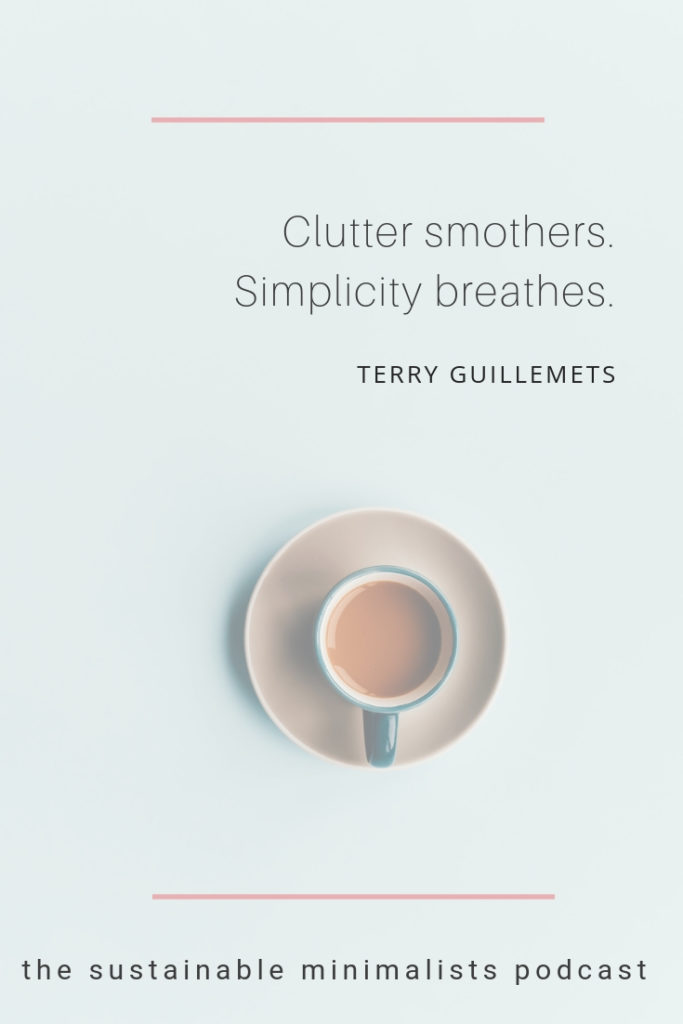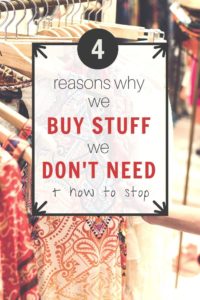Overbuy? Become a Conscious Consumer, Instead
How to become a conscious consumer
Are you a conscious consumer? Or do you often find yourself buying items you don’t need?
These days, many Americans boast supersized homes, an outfit for every day of the month + 300,000 possessions, on average.
We also report high levels of depression + anxiety; we have debt, too.
Have you ever wondered why we continue to buy more + more, despite the fact that our purchases don’t make us happy, send us into debt + destroy our planet’s precious resources?
I do.
Below, I outline four reasons why we buy things we don’t need as theorized in both evolutionary + behavioral psychology, plus ways to become a conscious consumer.
Why do we buy things we don’t need?
_
Reason #1: We chase the shopping high
_____
Back when early humans were hunter gatherers, hoarding food + other goods was essential for survival.
That’s because our ancestors lived for hundreds of thousands of years with the fear of scarcity looming over their heads. As a result, we evolved to accumulate.
But, these days, scarcity isn’t a real threat for most of us. Still, we continue to act like hunter-gatherers when it comes to our possessions.
How, exactly, did our biology encourage us to accumulate? A surge of the feel-good endorphin dopamine, of course.
Here’s how our ancient reward system works in 2019. You’re roaming the shopping mall. You see something you like, and you immediately want it. Soon after, you buy it.
Thanks to a surge of dopamine at the checkout counter + soon after, you instantly feel good.
So good, in fact, that you want to continue feeling good. So you chase the shopping high by buying more.
Dopamine is a powerful reward: It urges us to repeat behaviors that give us that endorphin hit even when doing so goes against our financial best interests.
While this reward system kept our ancestors alive, there’s a major problem with our ancient biology in modern-day America. These days, we live in a world that makes it to buy what we want when we want it.
As such, buying is less satisfying.
In order to get the same shopping high, we must consume more + more.
Reason #2: The Diderot effect
_____
Year: 1765. Location: France.
Enter philosopher Denis Diderot.
Denis was gifted a new robe, and not just any robe, either. A luxurious scarlet dressing gown.
At first, Denis was thrilled. He adored the thing.
But very soon after, his new robe tainted his other possessions. The fanciness of his new dressing gown highlighted the shabbiness of all his other stuff.
So what did Denis do?
He bought new stuff to replace the drab stuff, of course.
Diderot replaced his old straw chair with one covered in Moroccan leather.
He swapped out his old desk with an expensive new writing table.
The prints that he actually loved and hung on his walls? He replaced them with more expensive ones.
On + on it goes.
Behavioral psychology defines the Diderot Effect as the idea that obtaining a new possession creates a spiral of consumption which leads us to acquire more new things.
As a result, we end up buying things that our previous selves never needed to feel happy or fulfilled.
“
I was absolute master of my old dressing gown, but I have become a slave to my new one.
“
Reason #3: Advertisements are powerful
_____
Television was invented in 1927; the first station began broadcasting in 1928. For the first 13 years of its existence, television was advertisement-free.
But all that changed on July 1, 1941 when the first commercial aired.
Advertisements are much more convincing than we think they are + we are more susceptible to their power than we realize.
Some estimates suggest the average American in 2019 sees + hears an average of 5,000 advertisements per day.
Even the staunchest non-consumers amongst us are influenced by the 1.8 MILLION ads seen each year + that’s because we subtly adopt the messaging we see repeated over + over again.
Advertisers know what they’re doing. They purposely play on our deepest desires + our biggest insecurities as they bombard us with messages telling us to buy, buy, buy.
Here’s one powerful advertising technique: Perceived Obsolescence.
Planned Obsolescence is the term used to describe products that are intentionally made to break.
By contrast, Perceived Obsolescence is messaging that suggests our possessions aren’t good enough, even when our possessions are in solid working order.
Perceived Obsolescence urges us to buy *new* stuff to to replace our perfectly good stuff, like clothes that we don’t need but are more in style than our current garments or an updated smart phone with features the current one doesn’t have.
Further, advertisements play on human nature to compare + compete.
Before commercials, we competed solely with our neighbors (this is where the phrase keeping up with the Joneses comes from). And because the Joneses live in our neighborhood, it’s safe to assume the Joneses down the block are in our economic sphere.
Middle class, perhaps.
But the dawn of commercials (+ later, the internet) drastically expanded our reference frame for comparing + competing.
These days, because we see quite plainly how people in higher socioeconomic stratospheres live, we find ourselves competing with affluence far outside our financial means.
Although it isn’t a fair competition, it’s human nature to compete, anyway: We buy more stuff to live like the wealthy.
Reason #4: We are all cogs in the wheel
_____
In her book, The Story of Stuff, Annie Leonard outlines the Work-Watch-Spend Cycle:
In 2019, most of us go to work for at least 8 hours but probably more like 9 or 10.
We come home exhausted + plop down in front of the TV.
Commercials tell us we need new stuff so – in our rare free time – we go shopping.
In order to pay for it all, we have to work even more.
The Work-Watch-Spend Cycle repeats itself, over + over again.
4 ways to become a conscious consumer:
_____
- Limit exposure.
Have nothing to do on a Saturday? Don’t walk the mall for fun.
Unsubscribe from marketing emails.
Watch less television.
2. Embark on a No-Spend Challenge.
Commit to buying nothing frivolous for an entire month, then watch what happens to your bank account.
3. Let go of wanting things.
Mindfulness of our own buying choices gives us more control.
Give yourself both the time + space to introspect: Do you really need that new car? Or do you desire to sit behind the wheel of that fancy new car for reasons more complex than transportation?
Remind yourself that research finds over + over again that people who own a lot of stuff tend to be less happy than people who willingly accumulate less.
4. Understand your brain’s reward system.
Our brains are magic machines: they have the ability to rewire, so to speak, by making new pathways + connections.
That’s right: there can be such a thing as a No-Shopping High, if you work at it. New habits – like choosing not to buy – will be rewarded in time if you give yourself both the opportunity + the encouragement to practice.
Stay in-the-know!
Sign up for monthly eco-friendly inspiration.



